Tuesday 18th October 2022 7:45pm – Scottish Football League One – Falkirk Stadium, Falkirk
Fact: Facts make the world go round. It’s not love, or money, but facts.
Some facts are throw-away ones, instantly forgettable, others have some relevance but once in a while you stumble across one that you sneak under your coat, hoping no one else has seen the topical brilliance of it.
A wet Tuesday night to Falkirk is hardly the place you’d expect to find such a fact but here I was, minding my own business, chatting to a fan on the bus from Falkirk High stadium when enlightened me. Of course, I didn’t believe him. Nobody would believe him. I asked my group of football friends. Nobody knew. That’s when you know you’ve got a fact that you can dine, or at least drink out on.
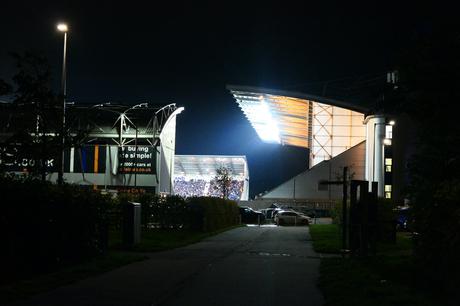
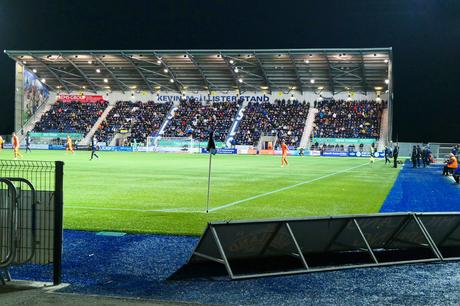
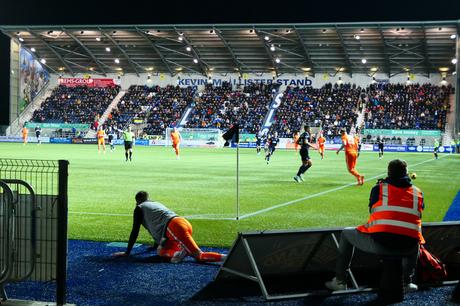
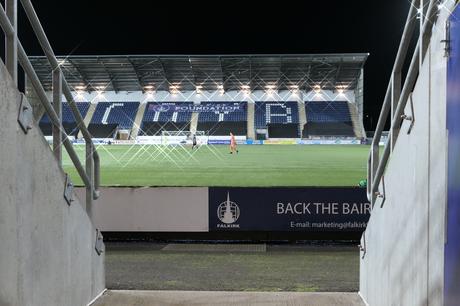
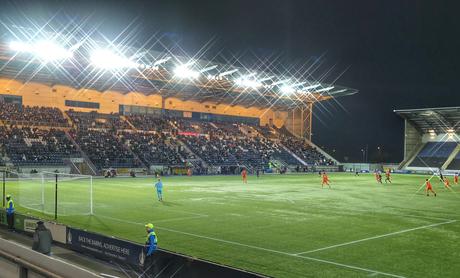
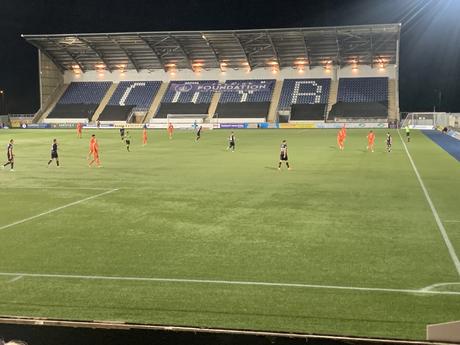
I’ve teased you enough. I’ve verified the facts and they appear to be true. So here goes.
The current World Record Transfer Fee was last broken in 2017 when Paris Saint-Germain paid Barcelona €198m for Neymar Junior. It was the 39th time the world record had been broken since 1922. Why 1922 you may ask. The reason is so astounding that you, like me may just spill your cup of tea (assuming you are holding one at this very moment) which isn’t ideal when you are on a bus.
Deep breath…A hundred years ago the record was broken for the transfer of West Ham United’s striker Syd Puddefoot for the sum of £5,000 by…Falkirk.
The transfer, announced on the 7th February 1922 was greeted by incredulity by the Football Post. “When will this folly on the part of football clubs come to an end?” The newspaper asked, more amazed that it was “little old Falkirk” who had been the buying club, who at the time were hardly one of the greats in the Scottish game. Puddefoot had been based in the region during the First World War and may have been “tapped up” by someone close to the club during that time but apart from putting 2+2 together, there’s no logical reason why the Englishman would have swapped London for the 7th biggest town/city in the Central Lowlands. What we do know is that a couple of Falkirk directors got a train down to London on the 7th February 1922 with five thousand pounds in cash and brought Puddefoot home with them (about £200k in today’s money).
He didn’t settle too well (no surprise there) and the club signed his brother Len during the close season to make him feel more at home. He had a fractious relationship with the fans as he told the press a few years later, constantly feeling that he had to prove himself.
“It is the attitude of spectators that upsets me,” he told the London Evening Standard in April 1924. “Twice this season I have leaped over the railings after spectators who have called me names no man could endure… my offence, so far as I can see, is an English accent.”
Puddefoot left for Blackburn Rovers in 1925 but for a whole 28 days one undred years ago he was the world’s most expensive player. He can’t even claim to have been usurped by anyone more glamorous with Sunderland paying £5,500 for Warneford “Wayne” Cresswell from South Shields in March.
As coincidence would have it, 100 years on and here I was, a West Ham fan, on a train as it sped through Sunderland and South Shields (well, close by) en route to Falkirk. A standard Tuesday night really. I should have been some 483 miles south of the Central Lowlands, readying myself for Lewes vs Aveley, but the ongoing protests on the QE2 Bridge had led to the game being postponed, without any consultation to us, by the Isthmian League. Naturally, Falkirk was my back up plan for the night.
Lying almost equidistant between Edinburgh and Glasgow in the Forth Valley, Falkirk is no bleak post-industrial wasteland. Voted Scotland’s most beautiful town a decade ago, Falkirk is a popular stopping-off point enroute to the Highlands, with the junction of the Forth and Clyde, and Union Canals at the Falkirk Wheel a wonder of modern engineering.
Talking of engineering, is there many finer structures in the town than the Falkirk Stadium. A 6 minute bus trip from Grahamston station drops you right outside the stadium, opened in 2004 to replace town-centre based Brockville Park, now a supermarket. The club had ambitions at the turn of the millennium to play once again in the Premier League but their ground was deemed unsuitable. They became the first, and only club, to be denied promotion to the top tier after winning the First Division title in 2003/04.
In 2005 the club moved into the new ground, located on the edge of the town, playing in a one-sided ground for a season before stands were built at each end. Nearly twenty years later the 8,000-ish capacity stadium is still short of an East Stand. But it did the job and after winning the 2nd tier in 2004/05, they took their place in the Premier League the following season.
You can’t deny it isn’t a smart stadium, although the missing side contributes to the Arctic winds that whistle around the stadium. I arrived just a few minutes after kick-off and was faffing around trying to find a seat in the surprisingly busy South Stand when Brad McKay gave the home side the lead, nodding in a corner. Five minutes later and it was 2-0, Juan Alegria slotting home from the edge of the box. The Colombian, on loan from Rangers, added his second and Falkirk’s third five minutes before the break to effectively kill the game off.
The second half was more memorable for the shocking performance of the referee, who denied both sides clear penalties and made numerous other strange calls that certainly seemed to favour the away stand. When Alloa’s Conor Sammon netted with a few minutes to go I swear the referee did a little skip for joy. But it was too little, too late and the Bairns had all three points and leap-frogged FC Edinburgh and Montrose into second place in the table.
Alas, there was nothing to commemorate the moment in history which saw Falkirk be record breakers, and the most famous football in the world, even if it was for such a small time.
Advertisement
